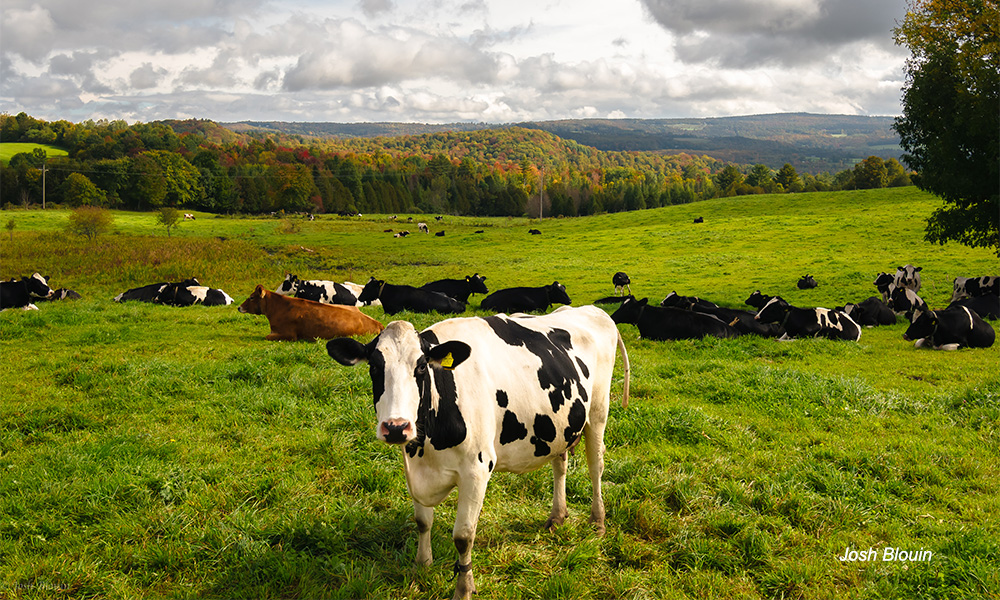Immigrant Workers Vital to Vermont Dairy Industry, Need More Social and Medical Support
Oct. 18th 2021The dairy industry is a staple of Vermont: herds of cows, rolling hills, and farming operations are still present in almost every part of the state. And yet this idyllic picture does not reflect the full reality that is dairy farming.
The dairy industry is highly competitive and prices are nationally subsidized. Therefore, hiring immigrant–and often undocumented–labor provides a way for dairy operations to minimize costs. However, some dairy farming practices can be quite harmful. The high demand for immigrant dairy workers, matched with a lack of financial and medical security, means that immigrant workers bear the brunt of the risks of dairy farming in terms of health issues, social alienation, and wage inequality.
The Vermont dairy industry is dependent on immigrant labor to compete in the nationally subsidized market. Bindu Panikkar, Assistant Professor at the University of Vermont (UVM) Rubenstein School says “This is quite problematic on multiple levels, because when the industry cut costs wherever they can, it impacts the workers the most. Migrant dairy farm workers face a variety of work-related health risks and barriers.”
Collaborating with the advocacy group Migrant Justice, Panikkar and former UVM College of Agriculture and Life Sciences undergraduate student Mary-Kate Barrett explore this issue in their article Precarious Essential Work, Immigrant Dairy Farmworkers, and Occupational Health Experiences in Vermont. Panikkar and Barrett conducted their own interviews with relevant community organizations in Vermont and used interviews and surveys done by Migrant Justice.
Almost 80% of the milk produced in the U.S. comes from farms that employ immigrant workers, and over 50% of all labor in the dairy industry is performed by immigrants. The dairy industry is central to Vermont: 20% of Vermont’s land is invested in agriculture, Vermont creates 63% of all milk produced in New England, and the Vermont dairy industry brings in roughly $2.2 billion dollars every year. These factors make Vermont an ideal setting to explore immigrant labor conditions in the dairy industry.
As for health risks and occupational hazards, the dairy industry has one of the highest fatality and injury rates among agricultural professions. A majority of injuries come from working with heavy machinery and equipment and handling animals. Furthermore, workers are exposed year round to chemicals and toxic contaminants, especially acidic cleaning materials, pesticides, and animal care products. Of the immigrant workers surveyed and interviewed, 67% were exposed to chlorine, 51% to iodine, and 43% to acid. Nearly half of all immigrant workers reported headaches, coughs, and itchy eyes as a result of these exposures. Simple measures such as protective gloves, masks, and aprons can be used in these situations, and yet about 70% of respondents report not having access to this protective gear.
Many of those surveyed reported unfair compensation and labor practices: 40% receive less than minimum wage, 40% have received no days off, and 20% have had their paychecks illegally withheld. This, along with occupational risks, infrequent or no pay raises, ten- to twelve-hour workdays, and inadequate housing, makes the full reality of the immigrant dairy experience clear. Mental health issues are also not uncommon among immigrant workers, with little support or resources there as well.
There is also a racial element related to immigrant labor in Vermont. “The industrial practice of invisibilizing risks also enforces racial capitalism within the dairy industry that disempowers and erases the experience of Hispanic workers in Vermont,” Panikkar says.
As COVID-19 proved, farm and dairy work are essential jobs. The U.S., and Vermont, needs immigrant labor to continue the strong tradition in dairy and even to grow operations for the increased food demand of the future. However, stronger policy and community interventions are needed to protect immigrant farm workers and increase safety measures within their jobs. This type of research, and the work of groups like Migrant Justice, are necessary for building a safer, more humane, and more sustainable dairy industry in Vermont.
 ecoNEWS VT
ecoNEWS VT